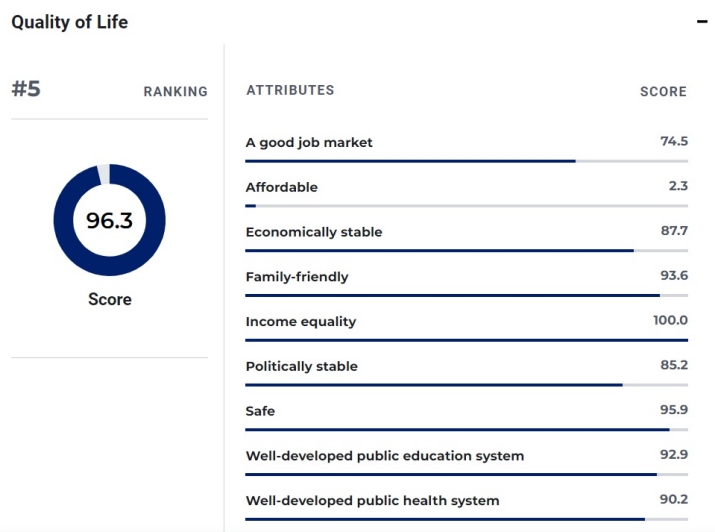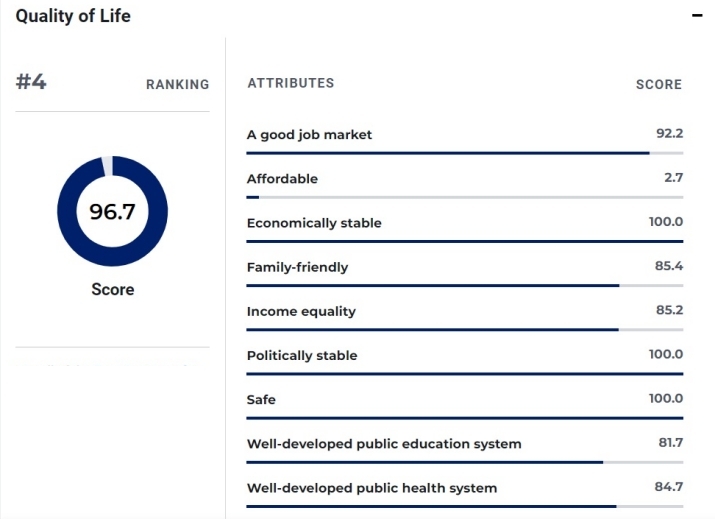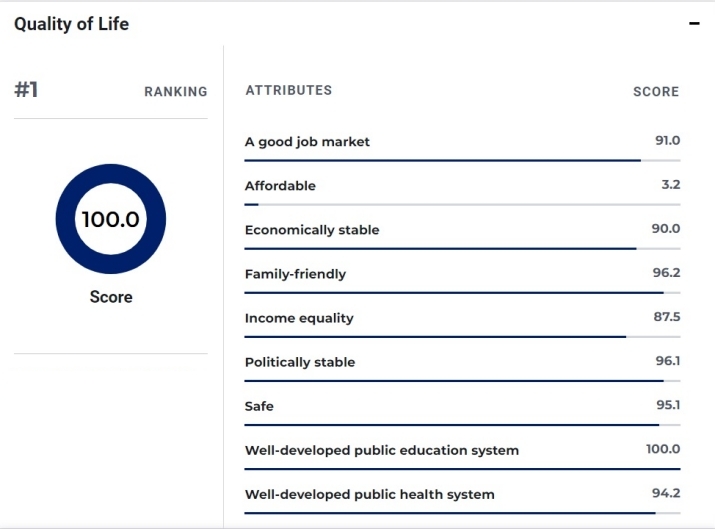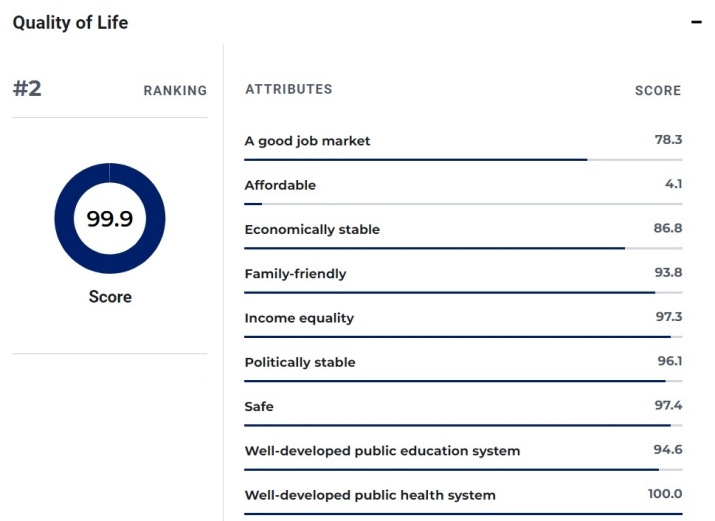10. New Zealand

New Zealand is known around the world for its high quality of living and slow pace of life.
New Zealanders are known for their hard work ethic, but they also value a healthy work-life balance. Even in the largest cities, a beach, bike route, or national park is never far away. If you are a citizen, or resident, or have a work visa valid for at least two years, public healthcare in New Zealand is free or low-cost. Even if you have a temporary visa, you may be able to obtain a variety of services under certain circumstances.
New Zealand – Quality of Life Attributes and Scores

9. Netherlands

The Netherlands came in seventh overall. Political stability and well-developed public health and education systems distinguish the country in the rankings. It was the first country to legalize same-sex marriage and is known for its tolerant society. It has the world’s highest concentration of museums and 32 thousand kilometers of cycle paths, encouraging people to be more active.
The Dutch pay 52% tax on their wages. However, they don’t complain as their country offers them a quality life. Public transport is very efficient, wages are good, the country is safe, and the education is excellent.
Netherlands – Quality of Life Attributes and Scores

8. Australia

Australia is a prosperous country to live in with a market-based economy. The residents of Australia love to be involved in sports and the life expectancy is long both for males and females. Cities in Australia usually rank high in livability assessments. Late in 2017, voters overwhelmingly approved same-sex marriage legalization.
The high quality of Australian education is also well-known around the world.
Australia – Quality of Life Attributes and Scores

7. Germany

Germany is without a doubt one of the world’s most powerful economic powers, ranking seventh overall in the list. The country boasts a strong economy, as well as well-developed public education and health systems. Other advantages include a trained and diverse workforce, as well as booming telecommunications, health, and tourist sectors.
Germany is also a global leader in imports and exports, as well as the birthplace of numerous historical cultural icons.
Germany – Quality of Life Attributes and Scores

6. Finland

Finland stands out in the rankings for its safety, well-developed public education system, and attractiveness to families.
The country is a global leader in education. Finland also ranks highly for performance in civil rights, quality of life, and press freedom. Finland was also one of the first countries in the world to give women the right to vote.
Finland’s economy is free-market oriented, and the country, like its Nordic neighbors, invests heavily in social safety nets and public services.
Finland – Quality of Life Attributes and Scores

5. Canada

Canada is one of the safest countries. While the standard of living in any country varies greatly from individual to person, a look at several social indices reveals the many things for which Canadians can be grateful. Canadians are typically healthy people who don’t suffer from any hazardous or infectious diseases in large numbers.
Canada is a high-tech industrial society. While the service industry is the most important economic driver in Canada, the country also exports a lot of energy, food, and minerals. Canada is the world’s third-largest oil producer. It also has the third-largest proven oil reserves. Because of the strength of the Canadian economy, Canadians have a very high quality of living.
Regarding most environmental quality criteria, Canada is in the top tier of nations. The Canadian constitution declares men and women to be legally equal, and provincial and federal human rights legislation protects them from gender discrimination by government and private sector businesses. Marriage, divorce, and military service are all formally gender-neutral under federal law.
Canada – Quality of Life Attributes and Scores

4. Norway

Norway comes second place overall in the survey. Norway’s security, stable policy, and well-developed public education system stand out in the rankings. The country is prosperous, with one of the world’s largest oil exporters, free higher education, and a long literary tradition.
The country is one of the most developed in the world, with a high standard of living and a reputation for being one of the best places to live.
Norway is also regarded as an excellent country in which to work in Europe, with policies such as maternity leave and gender equality standing out. The unemployment rate is low, and wages are competitive, particularly for those with advanced degrees.
Norway – Quality of Life Attributes and Scores

3. Switzerland

Switzerland’s ranking is assured by factors such as the economy, stable policy, and a well-developed public education system.
The country has a low unemployment rate and a well-educated workforce. The economy is fueled by low corporate tax rates, a highly developed service sector with excellence in financial sectors, and a strong high-tech manufacturing industry. As a result, living in Switzerland becomes very appealing to those considering a move to Europe.
Also, note that Switzerland ranks first in the Best Places To Retire survey.
Switzerland – Quality of Life Attributes and Scores

2. Sweden

Sweden stands out in the ranking of quality of life for health systems and well-developed public education, security, economic stability, and politics.
Furthermore, Sweden is committed to sustainability, human rights, wealth distribution, and university education. It is a beautiful country, with breathtaking landscapes, amazing cities, and an extremely educated population.
Sweden – Quality of Life Attributes and Scores
 Source: US News & World
Source: US News & World
1. Denmark

Denmark is the fourth in the world in terms of quality of life. Factors such as income equality, stable politics, security, and good public education and health systems affect Denmark’s ranking.
The Danish government is known as a very stable and transparent entity. The country operates under the constitutional monarchy and members of Denmark’s highest legislative body, Folketing, are elected by the people. The Danish government is progressive, and the country’s social structure has admirable social mobility.
Through progressive taxation, the country has a universal health system, in which citizens receive free medical care. Higher education is also free.
Denmark has several leading industrial sectors such as food processing, iron, steel and machinery production, and tourism. Agricultural and industrial machinery, pharmaceuticals, processed foods, and furniture are the main exports.
Denmark – Quality of Life Attributes and Scores

